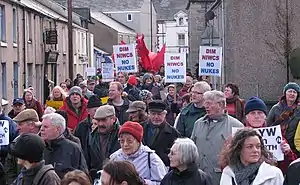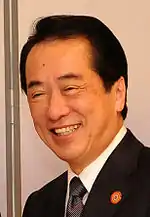
People Against Wylfa-B (PAWB, Welsh: Pobl Atal Wylfa-B) is a campaign group established in 1988 to oppose the construction of a second nuclear power plant at Wylfa on the north coast of the island of Anglesey, Wales.
"Pawb" is Welsh for "everybody".
The group's main objection to nuclear power are due to doubts over safety and concerns regarding the disposal of radioactive waste. PAWB also contend that nuclear power plants are vastly expensive and that cheaper, more environmentally friendly alternatives exist for electricity production.[1]
Much of the debate around a new nuclear power plant at Wylfa has centred upon the need for job creation on Anglesey.[2]
PAWB argued that little economic advantage has been gained from the original Wylfa Nuclear Power plant opened in 1971.[1] Anglesey having the weakest GVA economic indicator figures in the United Kingdom.[3]
Wylfa Nuclear Power Station
The first Wylfa Nuclear Power Station was constructed in the 1960s and opened in 1971, producing electricity until its closure in 2010.[4]
Wylfa-B and establishing PAWB
In the 1980s the UK government proposed a second generation of nuclear power stations and Wylfa was to be considered as a possible site. PAWB were established to campaign against the plans for the new plant - referred to as "Wylfa-B"
Following the 1986 Chernobyl nuclear disaster the UK government's plans were shelved. For many years after the Chernobyl disaster nuclear power was off the policy agenda in most countries and like many anti-nuclear groups world-wide, PAWB disbanded.[5]
Re-establishing PAWB

In the early 2000s, under the leadership of Tony Blair, the UK government again proposed a second generation of nuclear power plants and the British government announced that Wylfa was one of the sites it considered suitable. PAWB was re-established.[6]
In 2009 Horizon Nuclear Power (originally an E.ON and RWE joint venture, bought by Hitachi in 2012) [7] announced intentions build two advanced boiling water reactors (ABWRs) at a site to the south of the existing Wylfa station.[8][9]
Amongst PAWB's activities to have been a protest demonstration in Llangefni in January 2012 to support the Jones family of Caerdegog Farm who refused to sell their land to Horizon for the construction of the new plant.[10]
Following the Fukushima Daiichi nuclear disaster in 2011 PAWB established contacts with anti-nuclear campaigners in Japan. In 2015, at PAWB's invitation, Naoto Kan the prime minister of Japan at the time of the Fukushima disaster, visited Anglesey to plead for further nuclear power developments to be stopped.[11]
PAWB have consistently voiced doubts over the financial viability of the proposed Wylfa. In January 2019 Hitachi announced that they were unable to attract sufficient investment and were suspending their involvement in the Horizon Wylfa project.[12]
External links
- PAWB website: Home
- Magnox website: Magnox Ltd
References
- 1 2 "Facts".
- ↑ "Wylfa Newydd power station to create thousands of new jobs". www.matchtech.com.
- ↑ Anglesey has the lowest GVA in the UK, £13,655. https://www.bbc.co.uk/news/uk-wales-42425797
- ↑ "Wylfa definitely closing in 2010". July 20, 2006 – via news.bbc.co.uk.
- ↑ Diane Farseta |The Campaign to Sell Nuclear |author=Diane Farseta |date=September 1, 2008 |volume=64 |issue=4 |work=Bulletin of the Atomic Scientists |pages=38–56
- ↑ "Eight nuclear locations outlined". October 18, 2010 – via www.bbc.co.uk.
- ↑ "Hitachi buys UK nuclear project from E.On and RWE". BBC. 30 April 2009.
- ↑ James Murray (30 April 2009). "RWE/E.ON and EDF win nuclear auction". BusinessGreen. Retrieved 11 November 2010.
- ↑ "FAQs: WYLFA". Horizon Nuclear Power. Retrieved 11 November 2010.
- ↑ Elgan Hearn (Jan 25, 2012). "Hundreds protest against nuclear power station plans". Online Mail.
- ↑ "Ex-prime minister of Japan to campaign against Wylfa nuclear plant". ITV News.
- ↑ "Hitachi set to abandon new nuclear plant in Wales". Financial Times.